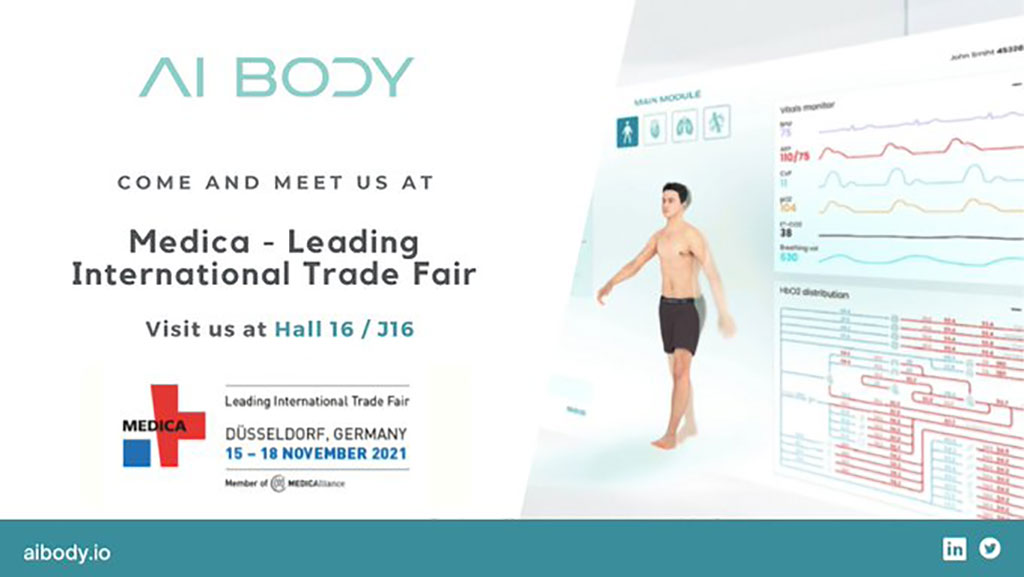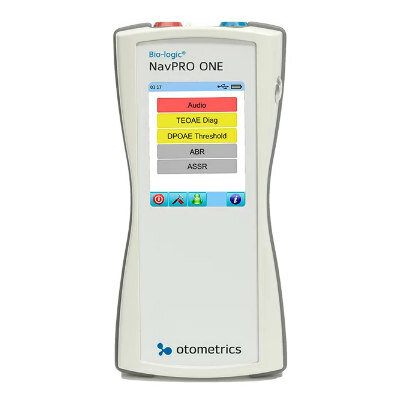World’s First Digital Human Organism Introduced at MEDICA 2021
|
By Dan Gueron, Publisher Posted on 16 Nov 2021 |

AIBODY.IO LTD. (London, UK) unveiled the world's first complete digital human organism which can simulate virtually any medical condition or treatment at MEDICA 2021.
The AIBODY platform can produce true-to-life, highly detailed physiological responses to virtually any simulated medical condition or treatment protocol. Rather than rely on mathematical models to mimic aspects of human physiology, AIBODY’s virtual patient software is modeled from the sub-cellular level up and incorporates 132,000 parameters that interact to create lifelike simulations of interrelated biophysical, physiological, and biochemical processes occurring within a human body. AIBODY’s core product realistically replicates all concurrent cardiovascular, pulmonary, and bleeding processes, with other organ systems available soon.
AIBODY’s user-friendly interface, enhanced 3D graphics, and unlimited opportunities for customization and collaboration are revolutionizing medical education and training. The cloud-based AIBODY platform offers a dynamic virtual learning environment in which teams can diagnose and treat a broad range of medical conditions without risk to live patients or the need for physical presence. The AIBODY AR solution introduces sophisticated gesture controls and intuitive layouts that enable team-wide immersive experiences for multiple, geographically dispersed users collaborating on practical simulation exercises.
“Our medical simulation software lets us observe and treat a true-to-life digital patient – in real time and from anywhere in the world,” said AIBODY CEO Richard Littlehales. “It responds to injury and treatment exactly as a real human organism would, leading to myriad potential uses in medical education, professional certification training, bespoke simulations of medical procedures, and AR blended with haptics. In the future, we envision expanding the use of our platform to assist with clinical decision support, patient engagement, and pharmaceutical R&D and clinical trials.”
“COVID-19 has exposed systemic vulnerabilities in medical education and training that AIBODY is well positioned to solve,” added Littlehales. “Ours is the first platform to combine a unique human physiology engine with state-of-the-art visualization technologies, creating a product that requires minimal setup and enables the running of industry-leading simulations within minutes. Projects we are already working on include bringing textbooks to life through real-time patient simulation exercises that test students’ theoretical knowledge, and building customized ‘flight simulators’ for doctors and medical device developers to practice actual treatment routines.”
Related Links:
AIBODY.IO LTD.

Latest Health IT News
- Printable Molecule-Selective Nanoparticles Enable Mass Production of Wearable Biosensors
- Smartwatches Could Detect Congestive Heart Failure
- Versatile Smart Patch Combines Health Monitoring and Drug Delivery
- Machine Learning Model Improves Mortality Risk Prediction for Cardiac Surgery Patients
- Strategic Collaboration to Develop and Integrate Generative AI into Healthcare
- AI-Enabled Operating Rooms Solution Helps Hospitals Maximize Utilization and Unlock Capacity
- AI Predicts Pancreatic Cancer Three Years before Diagnosis from Patients’ Medical Records
- First Fully Autonomous Generative AI Personalized Medical Authorizations System Reduces Care Delay
- Electronic Health Records May Be Key to Improving Patient Care, Study Finds
- AI Trained for Specific Vocal Biomarkers Could Accurately Predict Coronary Artery Disease
Channels
Critical Care
view channel
AI-Powered, Internet-Connected Medical Devices to Revolutionize Healthcare, Finds Study
A new study suggests that artificial intelligence (AI)-powered, internet-connected medical devices have the potential to transform healthcare by enabling earlier detection of diseases, real-time patient... Read more
Starfish-Inspired Wearable Tech Enables Smarter Heart Monitoring
Physical movement can make it challenging for current wearable devices to accurately track heart activity. Now, a starfish’s five-arm shape has helped resolve this issue. Inspired by the starfish's ability... Read moreSurgical Techniques
view channel
New Transcatheter Valve Found Safe and Effective for Treating Aortic Regurgitation
Aortic regurgitation is a condition in which the aortic valve does not close properly, allowing blood to flow backward into the left ventricle. This results in decreased blood flow from the heart to the... Read more
Minimally Invasive Valve Repair Reduces Hospitalizations in Severe Tricuspid Regurgitation Patients
The tricuspid valve is one of the four heart valves, responsible for regulating blood flow from the right atrium (the heart's upper-right chamber) to the right ventricle (the lower-right chamber).... Read morePatient Care
view channel
Portable Biosensor Platform to Reduce Hospital-Acquired Infections
Approximately 4 million patients in the European Union acquire healthcare-associated infections (HAIs) or nosocomial infections each year, with around 37,000 deaths directly resulting from these infections,... Read moreFirst-Of-Its-Kind Portable Germicidal Light Technology Disinfects High-Touch Clinical Surfaces in Seconds
Reducing healthcare-acquired infections (HAIs) remains a pressing issue within global healthcare systems. In the United States alone, 1.7 million patients contract HAIs annually, leading to approximately... Read more
Surgical Capacity Optimization Solution Helps Hospitals Boost OR Utilization
An innovative solution has the capability to transform surgical capacity utilization by targeting the root cause of surgical block time inefficiencies. Fujitsu Limited’s (Tokyo, Japan) Surgical Capacity... Read more
Game-Changing Innovation in Surgical Instrument Sterilization Significantly Improves OR Throughput
A groundbreaking innovation enables hospitals to significantly improve instrument processing time and throughput in operating rooms (ORs) and sterile processing departments. Turbett Surgical, Inc.... Read moreHealth IT
view channel
Printable Molecule-Selective Nanoparticles Enable Mass Production of Wearable Biosensors
The future of medicine is likely to focus on the personalization of healthcare—understanding exactly what an individual requires and delivering the appropriate combination of nutrients, metabolites, and... Read more
Smartwatches Could Detect Congestive Heart Failure
Diagnosing congestive heart failure (CHF) typically requires expensive and time-consuming imaging techniques like echocardiography, also known as cardiac ultrasound. Previously, detecting CHF by analyzing... Read morePoint of Care
view channel
Handheld, Sound-Based Diagnostic System Delivers Bedside Blood Test Results in An Hour
Patients who go to a doctor for a blood test often have to contend with a needle and syringe, followed by a long wait—sometimes hours or even days—for lab results. Scientists have been working hard to... Read more
Smartphone-Enabled, Paper-Based Quantitative Diagnostic Platform Transforms POC Testing
Point-of-care diagnostics are crucial for public health, offering rapid, on-site testing that enables prompt diagnosis and treatment. This is especially valuable in remote or underserved regions where... Read moreBusiness
view channel
Expanded Collaboration to Transform OR Technology Through AI and Automation
The expansion of an existing collaboration between three leading companies aims to develop artificial intelligence (AI)-driven solutions for smart operating rooms with sophisticated monitoring and automation.... Read more



















